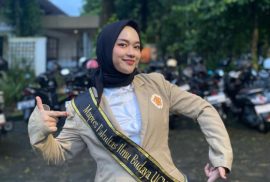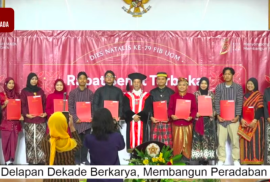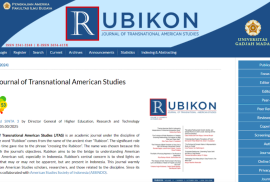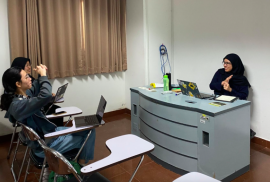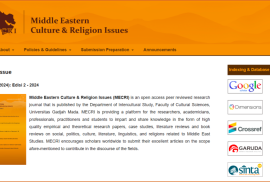Bulan Churniati Wins Prestigious Student Award at FIB UGM for Two Consecutive Years in 2024 and 2025
Yogyakarta, 27/3/2025 – In a remarkable achievement, Bulan Churniati, a student of the English Literature program at the Faculty of Cultural Sciences (FIB) of Universitas Gadjah Mada (UGM), has been awarded the title of Outstanding Student for two consecutive years, 2024 and 2025. This prestigious recognition was conferred during a ceremony held at the F11 Student Creativity Building on March 22, 2025, organized by the UGM Outstanding Student Community.
The evaluation criteria for this competition included a creative proposal, English language proficiency, and a portfolio that encompassed eight aspects: achievements/competitions, recognition, awards, organizational career, works, community service, and entrepreneurship. Bulan’s innovative proposal, titled “LitLingua (Literature and Linguistics Area): Reviving English Literature Literacy through Interactive Digital-Based Learning,” stood out among numerous submissions.
Bulan’s project aims to enhance access to education by utilizing digital platforms to make English literature more engaging and accessible to students. The prototype of the project can be accessed through the link bit.ly/LitLingua, showcasing her commitment to promoting literacy in a modern context. This initiative aligns with the Sustainable Development Goals (SDGs), particularly the goal of ensuring inclusive and equitable quality education.
The selection process for the Outstanding Student competition involved several stages, including document selection, faculty-level presentations, and a supercamp presentation at the university level. Out of the many students from FIB who registered, only two were selected to represent the faculty: Bulan Churniati and I Ketut Aditya Prayoga from the Tourism program.
Bulan expressed her gratitude for the recognition and emphasized the importance of creativity in education. “I believe that literacy should be accessible to everyone, and through innovative approaches like LitLingua, we can inspire a love for literature among students,” she stated during her acceptance speech.
The competition not only highlights individual achievements but also reflects the commitment of UGM to foster a culture of excellence among its students. The university has been actively promoting initiatives that encourage students to engage in creative and critical thinking, which are essential skills in today’s rapidly changing world.
The recognition of Bulan Churniati as an Outstanding Student serves as an inspiration for her peers and highlights the importance of access to education in fostering talent and innovation. UGM remains committed to supporting its students in their academic and creative endeavors, ensuring that they have the resources and opportunities to succeed.
[Public Relation Faculty of Cultural Sciences, Bulan Churniati]

